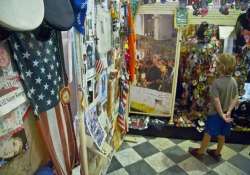NYC church opens contest to give 9/11 sermon
New York: Leaders of a chapel near ground zero that became a sanctuary of consolation after the 2001 terrorist attacks are launching two national writing competitions to foster reconciliation, including one that will allow the

New York: Leaders of a chapel near ground zero that became a sanctuary of consolation after the 2001 terrorist attacks are launching two national writing competitions to foster reconciliation, including one that will allow the winner to deliver an original sermon on Sept. 11.
The Parish of Trinity Church, which includes St. Paul's Chapel, will award one prize for preaching and six for storytelling in memory of the tragic day.
Trinity's rector, Rev. Dr. William Lupfer, said the idea for the writing competitions came about because visitors to the World Trade Center site still struggle to make sense of the attacks, more than a decade later. But the competitions are meant to address more than 9/11.
"Communities are having important conversations about violence, racism, and hatred, and how we work towards healing," Lupfer said. "St. Paul's is a place of hope for millions of people, and this year we want to commit to asking what reconciliation looks like now, in this world, at this time."
Lupfer said the storytelling and preaching prizes address the matter from different perspectives, one secular and one theological.
The Episcopal church, known as "The Little Chapel That Stood," is directly across from the World Trade Center but was unscathed when the attacks brought down the twin towers. It was turned into a makeshift shrine and became a place of rest and renewal for volunteers and responders. Today, tourists from around the world flock to the house of worship where a number of Sept. 11-related artifacts are on display, including memorial banners from around the world.
The winner of the Reconciliation Preaching Prize will deliver an original sermon during a special service at St. Paul's on Sept. 11. The sermon must deal with reconciliation and address the texts of Isaiah 2:1-4 and Matthew 18:21-35 - texts Lupfer hoped would challenge applicants "to consider what reconciliation means.